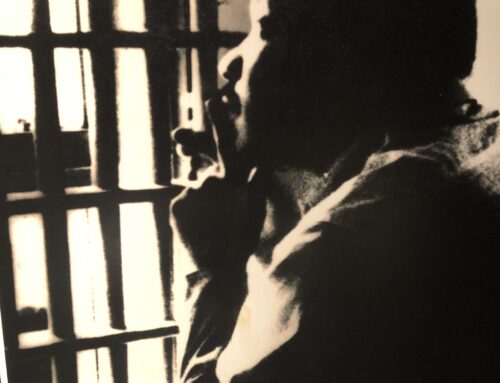 It was late Thursday night. The place was Gethsemane. Jesus was praying. The disciples just didn’t have it in them, but Jesus was praying to His Father, sweating drops of blood as he agonized over the cup he would soon bear.
It was late Thursday night. The place was Gethsemane. Jesus was praying. The disciples just didn’t have it in them, but Jesus was praying to His Father, sweating drops of blood as he agonized over the cup he would soon bear.
While Jesus was praying and the disciples were sleeping, the clanging of swords stirred in the courtyard of the Temple as officers and servants congregated for this late night detail. Judas was surrounded by a “multitude of men” (perhaps as many as 1000) carrying weapons and torches that would break through the dark night. They got in formation…rank and file. The captain of the guard gave Judas the signal for him to lead the way. And Judas began the tragic walk from the Temple to the Garden of Gethsemane.
The crowds in the streets moved aside as Judas led this multitude out of the Temple courts then beyond the city gates. Leaving the city proper, they stepped into the Kedron Valley east of the Temple and began walking down toward the Kedron Brook.
Stop the scene for just a moment.
The city of Jerusalem was filled with people there to celebrate the most prominent Jewish feast of Passover. Actually the Feast of Unleavened Bread and the Feast of Passover were celebrated together for eight consecutive days.
Some scholars say there were approximately 2 million people in Jerusalem for this week of celebration. There were no hotels available. All the restaurants were booked. The campgrounds were full. The city was teeming with people.
But the twelve disciples found an upper room and reclined at the table with Jesus. Despite Da Vinci’s interpretation, these thirteen men were on the floor, propped up on pillows with one arm and their feet behind them. John was likely on Jesus’ left and Judas was at a place of honor on Jesus’ right.
As they ate, Jesus told them, “one of you will betray Me.” They couldn’t believe it. They each asked if it would be them.
To answer he said, “He who dipped his hand with Me in the bowl is the one who will betray Me.” This bowl contained a paste of ground apples, dates, pomegranates, and nuts. It symbolized the mud and clay the Israelites used for making bricks in Egypt. It was again a reminder of what God had delivered His people from. Yet it served in this moment to foretell the life Judas was choosing…he was trading freedom and life for the bitter herbs of bondage and death.
Now back to Judas’ walk to Gethsemane…
Within in a two-day period over 250,000 lambs would be sacrificed in observance of Passover. The blood of those sheep would drain from the Temple down into the Kidron Brook. As Judas and his armed entourage walked to the bottom of the Kidron Valley, their feet splashed through the Kidron Brook now running red with the blood of spotless lambs. And up the hill they went to arrest and shed the innocent blood of the Lamb of God.
Although the disciples were likely still oblivious to their surroundings, Jesus could hear the steady gate of the soldiers drawing closer by the moment.
So Jesus came one last time to his disciples and said, “Are you still sleeping and taking your rest? Behold, the hour is at hand and the Son of Man is being betrayed into the hands of sinners. Arise, let us be going; behold, the one who betrays Me is at hand!”—Matthew 26:45-46.
How is it that a man can follow Jesus for three years, participate in life-changing ministry, witness miracles, experience all the privileges of companionship with Jesus, and then do this?
C.S. Lewis said, “Of all passions, the passion of the Inner Ring is most skillful in making a man who is not yet a very bad man do very bad things.”
Notice these truths about passion of the inner ring:
Pursuing the inner ring elevates privilege. Jesus promotes service.
Judas wanted power and position for what he could gain rather than for what he could do for others. Many seek Jesus for that end and are equally disappointed.
Pursuing the inner ring takes from others. Jesus gives to others.
Some people say all the church wants is our money. That’s not true, Jesus wants everything. Jesus was clear that following Him requires it all. And that was simply too much for Judas and it’s too much for many others as well.
Pursuing the inner ring provides immediate results. Jesus thinks long-term.
Judas was building an earthly kingdom. Jesus calls us to an eternal one. Loss is certain for the one who builds a life around the wrong kingdom.
Pursuing the inner ring creates a façade. Jesus exposes heart.
Being found out like Judas was is not the biggest problem…Jesus already knows us. But being found out and staying the course is the most devastating decision we will ever make.
Pursuing the inner ring builds a false sense of security. Jesus gives authentic victory.
Judas felt large as he turned Jesus over to the Roman soldiers. But soon after the arrogant kiss of betrayal, he too was betrayed by everyone around him. There is no Christ-less victory in this life or the next.
As Judas met Jesus in the garden, Jesus said, “Friend, do what you have come for.” The word “friend” is the word for “acquaintance” or “one familiar.” Jesus was not affirming Judas but rather indicting him for being so close yet never actually becoming a true friend and loyal follower. Familiarity with Jesus is no substitute for faith in Jesus.
Peter wrote many years later, “Be all the more diligent to make certain about His calling and choosing you”—2 Peter 1:10.
Peter understood this as much as anyone. We all know about his failure on this same Thursday night. But we also know about his repentance and how Jesus restored him to a place of honor. Peter would shout to us, “Be sure…be diligent…determine that no temporal gain is worth the eternal loss. I came so close to throwing it all away. Make sure of your calling!”
Judas likewise would cry to us from a fiery hell, “Don’t make the mistake I made. Don’t be so close to Jesus and remain unchanged. I had the chance, but I gave it all away for 30 small pieces of silver. It’s not worth it. Don’t do it.”
Jesus defeated sin, death, and the grave on Easter Sunday, but that victory is actually a tragic defeat for mere acquaintances of Jesus. Despite Judas being in the inner ring, he missed Easter. He traveled with Jesus, but never trusted Jesus. So Easter is enjoyed not by those who are simply near Christ, but only by those who are in Christ.
At this point, I would love your comments. What other tragedies of the “inner ring” do you see illustrated in Judas’ life?





What a great reminder to inspect our motives!
Thanks Steve. Hope you guys have a great Easter!
What great writings of the price paid for us. You know what excites me?! IF it had been just me, just me, He would have still done this. That thought impacts me greatly. Loved this; thank you!
You’re exactly right. Thanks for comment. Enjoy Easter. Jesus is alive!